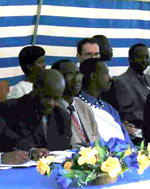UNESCO supported campus radio on air in Rwanda
23-11-2005 (Kigali)

Inauguration ceremony
© UNESCO
The first university / community radio station in Rwanda was officially inaugurated on 18 November 2005 in the Southern town of Butare, where the National University of Rwanda (NUR) is located.
Radio Salus, which is based on a student naming competition, broadcasts 16 hours a day primarily in the Kinya-rwandan language and has the potential to reach some two third of the Rwanda population. It was created by NUR under a UNESCO project funded by the European Commission.
A variety of news, educational and entertainment programming is produced by a team of four professional journalists headed by Martin Semukanya, in cooperation with lecturers and students from the school of journalism and from other NUR’s faculties, in addition to input from other rural, urban, and student communities.
The station is overseen by a Council of Advisers chaired by NUR’s Rector and composed of three other members from the academic Senate including the dean of the School of Journalism and Communication, two representatives from students’ associations, one representative from the ministry of information and three members representing both the local, urban, and rural communities.
"The Radio itself will serve the Rwandan population" said NUR’s Rector Professor Chrysologue Karangwa during the station’s launch, which was also attended by the Minister of Information and by the Governor of the Butare province, "and also it will serve as a training tool to offer outstanding educational and training opportunity to students."
Since 2004, ten years after the genocide, when the government opened the air waves to private radios, five other radio stations have received licenses and started broadcasting in Kigali in the three national languages (Kinya-rwandan, English and French).
In late 2003 a manager of Radio Mille Collines was condemned by the International Criminal Tribunal for Rwanda to life imprisonment for his notorious role in the "hate radio" during the genocide. His colleague was sentenced to 35 years of jail.
A variety of news, educational and entertainment programming is produced by a team of four professional journalists headed by Martin Semukanya, in cooperation with lecturers and students from the school of journalism and from other NUR’s faculties, in addition to input from other rural, urban, and student communities.
The station is overseen by a Council of Advisers chaired by NUR’s Rector and composed of three other members from the academic Senate including the dean of the School of Journalism and Communication, two representatives from students’ associations, one representative from the ministry of information and three members representing both the local, urban, and rural communities.
"The Radio itself will serve the Rwandan population" said NUR’s Rector Professor Chrysologue Karangwa during the station’s launch, which was also attended by the Minister of Information and by the Governor of the Butare province, "and also it will serve as a training tool to offer outstanding educational and training opportunity to students."
Since 2004, ten years after the genocide, when the government opened the air waves to private radios, five other radio stations have received licenses and started broadcasting in Kigali in the three national languages (Kinya-rwandan, English and French).
In late 2003 a manager of Radio Mille Collines was condemned by the International Criminal Tribunal for Rwanda to life imprisonment for his notorious role in the "hate radio" during the genocide. His colleague was sentenced to 35 years of jail.
 First broadcast of Radio Salus
First broadcast of Radio Salus© UNESCO
Related themes/countries
· News Archives 2005
· Community Media: News Archives 2005
· Rwanda: News Archives 2005
Share this story:
Contact information
-
Contact
- Tarja Turtia, UNESCO, Division for Freedom of Expression, Democracy and Peace
- Andrea Cairola, UNESCO, Division for Freedom of Expression, Democracy and Peace
- UNESCO
Source
- UNESCO Office in Nairobi
Field office














